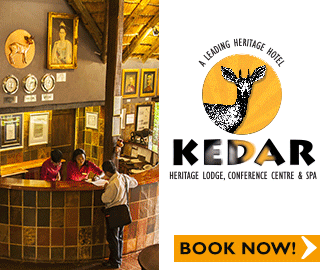
Leading From The Front: An Exclusive Interview With Caleb Mbaso
BY JO KROMBERG 26TH JAN, 2015 13:46
Caleb Mabaso is a pioneer in the Southern African hospitality industry. Having started out as a waiter at the Johannesburg Sun and Towers, from 1986 to 1987, he has risen like a Phoenix to hold senior positions with various hospitality groups. Nomad Africa's Jo Kromberg chatted to this interesting and passionate African achiever about going green...

Caleb Mbaso
Caleb has also chaired various boards such as THETA and FEDHASA (Federated Hospitality Association of Southern Africa) Inland where he provides overall strategic direction and maintains effective stakholder relations. He also works closely with governmental officials and institutions in constantly bringing up issues affecting business people in the tourism/hospitality sector.
He is currently a board member for the University of Johannesburg’s School of Tourism and his passion for youth development has seen him spearheading the development of the recently launched Tourism Youth Chapter under the auspices of FEDHASA. Graduating from the University of Free State, South Africa with a B Comm. degree – Business Management, Caleb has also completed courses on Governance for Public Institutions and Change Management. He was Chairman of the Board of CATHSSETA for two years as well where he prodided strategic leadership and direction for the organisation.
JK: You have been in the hospitality industry for more than 15 years - what have been the most significant changes in the industry during the last five years in your opinion and in terms of what you have observed?
CM: Additional room inventory has definitely changed the landscape over the years. Leading up to 2010, there was huge investment layout, which significantly added to the number of hotel rooms available in South Africa. There has also been a huge interest in the “green tourism economy” – both on the supply and demand side.
JK: Tell us a bit about the work of FEDHASA and your role in the Organisation?
CM: First I have to say that we are proud and pleased with the confidence shown by members, which has made us one of the oldest business associations in South Africa. FEDHASA is primarily in existence to mitigate all issues that business people in hospitality might be confronted with. It is our business to ensure that such issues are taken care of and that business people are allowed time and space to concentrate on delighting their guests. We do a lot of work in the legal space and also appear regularly in Parliament to present the business case to the country’s political masters.
We have in this regard experienced a high level of success in assisting legislators understand the business side of their decisions, and in some cases change those decisions. Due to the size of our membership, we do negotiate bulk discounts on behalf of members. A good example here is that we were the first association to negotiate a corporate discount for TV licenses. We are currently far down the line negotiating discounts along similar lines. I serve the organisation as Head: Strategy and Projects. We currently do not have a full time CEO and I fulfil that role together with the Chairman. I am tasked with reviewing and enhancing the organisation’s revenue model/structure.
JK: The Lilizela-Imvelo Awards for Responsible Tourism is under the custodianship of FEDHASA. How significant are these awards and what are the criteria for winning such an award?
CM: The awards were conceptualised when South Africa hosted the historic World Summit on Sustainable Development, 12 years ago. At that stage a call was made by the then Minister to fully embrace the concept of sustainability in a very visible manner. FEDHASA has energetically represented the tourism industry in encouraging best practice on business sustainability issues. The Awards cover a wide array of issues including social, environmental and economic matters. South Africa has, through the National Department of Tourism, become a forerunner in matters of sustainability. We are the second country to publish National Standards on Responsible Tourism (SANS 1162), which guides the country’s efforts on this very crucial matter. FEDHASA remains the custodian for the Awards but appoints independent persons to serve on its adjudication panel, which decides on winners for the various awards.
Every year the quality and intensity of the entries gets higher and higher, which is an indication that industry is embracing the Lilizela-Imvelo Awards as the premier benchmark of best practices in sustainable tourism. We were amazed and impressed at how much effort the entrants put into telling us their stories and we believe that this is because the industry is recognising the significant value that being a finalist in these awards brings to their businesses. Also, the creation of big and small sub-categories has enhanced the credibility of the awards. There will always be a perceived bias towards big business because there is a greater likelihood of bigger budgets being allocated towards sustainable tourism. This should take no credit away from large establishments as there are many of the same size and budget who choose not to embrace sustainable tourism. However, an institution without access to big budgets but whose heart is in the right place with regard to sustainable tourism should be competing against establishments of a similar circumstance.
The creation of categories that allow entrants to compete against like-sized businesses sends the message that, large or small, there will be no discrimination. In terms of entering, it is very important that entrants provide detailed supporting information for their entry. The process is not very prescriptive but clear guidelines on the criteria are provided for prospective entrants.
JK: Do you think South Africa really is an "eco-friendly" destination or is there some false marketing around that concept?
CM: South African tourism woke up to the reality long before other developed destinations did. We can as a country do a lot more in communicating this message more accurately. It is very helpful that we now have a responsible standard that we can use for assessments and benchmarking which can provide better impetus to all marketing efforts. We believe that consumers are very discerning in this regard and have always included “eco-friendliness” questions in their procurement decisions, so as such it’s getting more pronounced. As an establishment, you can stand out-out if you adopt eco-friendly practices.
JK: Do you think there is a need for an independent "green" grading system such as the star grading system?
CM: Yes, there is a need for a credible “green” grading system in the country. That is partly why we have to appreciate the National Responsible Tourism Standard – it does precisely this. Now an opportunity exists for all such schemes to be regulated and accredited. FEDHASA is taking the lead in this regard and has applied through SANAS to become an accreditation body. What this means is that institutions wishing to administer an accreditation or grading systems will be able to register with FEDHASA and seek suitable accreditation. This affects even long-established systems, which will need to seek official accreditation through the SANAS system.
JK: How can lodges and hotels without big budgets become less wasteful and utilise natural energy more?
CM: We must always tell the industry that going green is not a feel-good factor but a very sound business decision. There is definitely money to be saved and made if you adopt green business approaches. Whilst it might sound very good and responsible to utilise business methods that don’t consume much electricity, the reality of it is that if you use less electricity, you will pay less and manage one of the most notable expense lines in your business. This is true for water and every other energy input.
I have been exposed to various businesses that have gone on aggressive drives to do business in a more eco-friendly matter. The outcome is always inclusive of massive discounts that were not even forecasted at the beginning.Going this route is definitely in line with business sustainability principles and leads to better profitability.
JK: Are foreign tourists becoming more discerning and knowledgeable when it comes to choosing an eco-friendly property to vacation at? If so, who are they and what do they demand?
CM: Our guests, especially European, have long been demanding that products they use are eco-friendly. Price for them is no longer the deciding factor, but eco-friendliness is! Our establishments have caught on and realised how valuable it is for them to market their responsible tourism efforts. It is not unusual anymore to find information in the room about how the particular establishment does on the responsible tourism thing. Guests are obviously intrigued about this information and many even volunteer or make commitments of support to such establishments.
There is definitely strong commercial merit for businesses to adopt responsible tourism practices as it directly impacts on their marketing efforts. In one instance, a business reported almost 60% in occupancies after being published as a finalist for Imvelo Awards, a steep curve up! If we keep going the way we are in the industry, the sky’s literally the limit.








